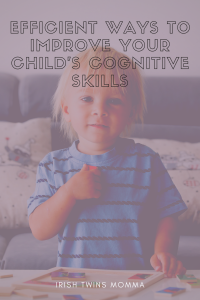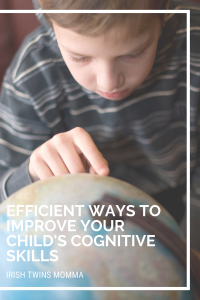This post contains affiliate links. If you click and buy, I may make a commission, at no cost to you. See my disclosure policy for more information.
Cognitive skills can be a tricky thing to evaluate. We all know that they’re vital to success in school and out in the real world, but we don’t always think about how we can improve them. If you want your child’s cognitive skills to flourish, read on for some of our top tips for optimizing their development!
What are cognitive skills?
First off, let’s define what these elusive “cognitive” (or intellectual) skills are. Cognitive skills are skills that help you focus your attention, solve problems, and reason. These skills are required for reasoning and problem-solving at school but are also very important in the real world.
In developed countries, cognitive skills tend to be superior to most nations outside North America and Europe. But it’s still vitally important to focus on these skills since many children in developing countries are not doing as well as they need to be throughout their lives. Cognitive development is vital not only throughout childhood but also throughout adulthood.
Many parents view learning as something that happens while in school, but this is not necessarily the case. Learning is a life-long process, and early childhood is a time when it can begin. These skills are ideal for anyone who wants to do well at work or school and succeed in life.
Learning doesn’t just happen while you’re sitting in class or doing homework, though. There are a lot of things that go into development and learning.
Tips in Improving Your Child’s Cognitive Skills
-
Stay aware of your child’s learning environment.
Children learn differently, and often the best way to do well in school or as an adult comes from having an awareness of how you learn best. Whether that means using colors, visuals, or something else entirely varies from person to person. One way that has been shown to help kids is seeing their homework assignments and notes while doing it.
-
Play with your child.
Play is something that children of all ages can learn to do and is suitable for several reasons. First off, play helps prevent anxiety and stress, which is excellent for your child’s mental health. It also helps them develop muscles (because they have to use them), encouraging physical activity in the future.
-
Encourage lots of variety in your child’s learning environment.
When you’re trying to develop cognitive skills, it helps to have an environment that asks your child to do different things. For instance, it is much more effective if your child plays with other toys that they don’t usually play with every day, rather than the same toy. By doing this, they’re forced to use more of their brains and think about what they’re doing – and that’s what it takes to grow a cognitive skill!
-
Teach complex concepts early on.
As a parent, you mustn’t shy away from teaching complex concepts to your child. Doing so can help them develop confidence and make learning more accessible in the long run. Not only that, but it means that they will have something to talk about when they’re growing up and looking for jobs!
-
Get them into sports!
Sports are an excellent way to help children develop physical skills and teamwork abilities. They’re also a great way to encourage exercise, which is always good for your health. In addition, sports can help kids stay active and healthy when they’re older. It’s essential to start them early on and make it fun!
-
Encourage your child to be an active listener.
Children learn best when they engage their entire bodies in the material that they are being taught. When your child is listening to a lecture or being taught something, ask them to open their books and take notes. By engaging their hands and bodies while they enjoy the material, they’ll absorb it much more quickly than if they were sitting there bored out of their minds.
-
Understand what learning styles work best for your child.
Every person has different learning styles that work best for them. The best way to get your child to learn is by finding out what they’re best at with their studies. For example, suppose a student has trouble memorizing facts. In that case, they could benefit from getting them into something that allows them to visualize how the information will apply to their future lives. To find out your child’s learning style, try using some of these resources:
-
Model what you want them to do and how you want them to behave.
It’s essential to set an example for your children through the things you do. It doesn’t mean they have to be perfect, but it means that you should do your best. Modeling is an excellent way for your child to learn what is expected of them and teach them how to be a better person.
-
Ask them to do something you know they’re not capable of doing.
It will encourage kids to go beyond what they usually can and grow their cognitive skills in the process. This exercise will also help develop their self-confidence, which is always beneficial for them.
-
Teach your child how to think logically.
Logic is an essential part of life and one that many people do not use as much as they should. By teaching your child to think logically, you’re helping them become a well-rounded individual, and that’s beneficial for them.
-
Get them into an excellent preschool program.
When students go to elementary school, they’re exposed to many different subjects in the classroom. As a result, this is an excellent time for them to grow their intellectual skills and abilities, especially math and science classes!
- Allow your child to take on complex tasks and experiences.
By pushing your child, you are encouraging them to develop cognitive skills that will benefit them later in life. Not only that, but you’re also helping them learn how to deal with the world around them with the best possible outcomes.
Ultimately, the only way to ensure your child a bright future is by encouraging them to learn and grow intellectually. While they need to have good grades and develop their social skills, they also need to be confident in their abilities. By setting an example for them through what you do, you can help them develop these abilities.
What steps do you take to help your child grow intellectually? Let us know!
Guest Post by Andrea Gibbs





Leave a Reply